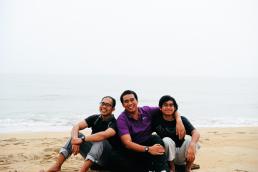This is an unpublished essay for my travelogue, Why I Travel. The book was published by MPH Publishing in 2017.
“I want to trek the Himalayas,” I told Adi one day over breakfast. He regarded me with contemplation, as he always did when I suggested random activities out of the blue. We had both come from the heels of Ben Stiller’s latest flick, The Secret Life of Walter Mitty, the fictional tale of TIME Magazine’s photo editor who after decades of dead-end employment, embarks on an adventure that takes him halfway across the globe. At best, the film was inspiring and the final scene of the Himalayas vista stuck with me long after the credits rolled.
“Well, we’ve to start conditioning then,” Adi replied. Adi himself was an active hiker, going on hill trails every other weekend with his group of friends. He often told stories of his expeditions, especially Gunung Datuk where he claimed was the most difficult he’s encountered in the Peninsular. Adi suggested Bukit Gasing in Petaling Jaya, close to where we lived. A lot of people who wanted to condition before a climb usually started there. ”You haven’t even conquered Kinabalu yet, bro,” Adi laughed.
That same weekend, we recruited Asyraf – completing our group. Before the hike, the three of us were already embarking on random adventures across the country. Be it a random midnight drive down to Malacca or an island visit across Port Klang on a monsoon morning. We had been doing this for almost two years now, embarking on random adventures every other month. But this time, I wanted to go overseas. I desired nothing more than to see the Himalayan peaks glitter in the gleaming sunrise. Sure, blogs, films and photographs may have romanticized the idea but it was still an ambition nonetheless.
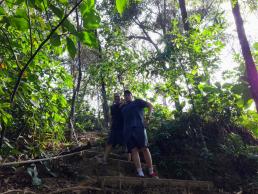
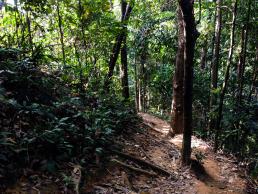
On a Saturday morning, we arrived at the foot of Bukit Gasing, on the Petaling Jaya side after navigating the neighborhood behind the La Salle Secondary Boy’s School. We started at 9 A.M., relatively late by hiking standards. Being minimally fit, we scaled the hill with difficulty and arrived its (supposed) peak after crossing the bridge and a precarious vertical scale. We sat on the earth, panting. A few other hikers offered us oranges that we gladly accepted.
“Do you really think you can walk the Annapurna like this?” Asyraf asked me after our sore muscles had cooled down a little.
“Well, from what I’ve read it’s not a continuous vertical climb. Plus, I can spread my energy out over the hike”.
Both Asyraf and Adi told me that it would be weeks of conditioning before I can even deem myself fit for a month-long hike across the Himalayas. I quietly agreed. Though I’ve had friends who told me they’ve trekked across the Annapurna with little to no conditioning, I’d rather be safe than sorry. The possibility of an adventure being cut short from continuous cramps and oxygen shortage was an unpleasant thought.
We continued our hike, taking random routes around the hill. After what seemed like half an hour of silence and no human contact, Asyraf commented, “We’re really just blindly hiking here, aren’t we?”
“The blind hikers… That’s what we are,” Adi laughed.
And so we gave ourselves the name Blind Hikers. An idea that began with an ambition to trek across the Himalayas but evolved into a series of adventures across the Malaysian Peninsular. Seeking for stories and experiences that’s a step further from what a normal traveller might expect.
A year before the hike up Bukit Gasing, Adi and I went on a backpacking trip to Chiang Mai, Thailand where we sampled local experiences and culture. On one of the fateful nights, we met with a former foreign correspondent that had set up a press club and wine bar that stood unnoticed on the bustling street of Thonon Rachadamnoen in central Chiang Mai. His life experiences itself was an adventure, something that is covered elsewhere in this book.
But he left me an impression of discovery and how much we’ve lost seeking for the unknown. Months later after that night’s conversation, Bob, the foreign correspondent, posted online his thoughts on how online travel sites have taken the fun out of travelling. How the pleasant surprise behind discovering new experiences is now lost when reviews expose secrets that were once shared between a few travellers who would wink to one another in acknowledgement of this secret knowledge.
That is no longer the case.
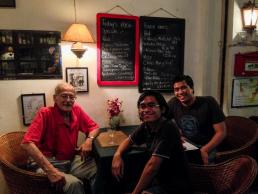
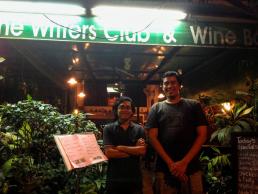
And while I may not fully agree with Bob. I understand his perspective on discovery. On unearthing what is not visible to the eye (and travel review sites). The sheer joy of exploration and knowing we’ve gone a step further than others. It’s with this ethos that Adi, Asyraf and I travel together.
When it comes to travelling, there is a lot of luck involved. There is a plan, but with travelling – it’s about taking it beyond a textbook journey. Such as the time we were in Bukit Besi, Terengganu on the search for a story behind the long-gone mining community. A chance encounter with the Head Imam of Bukit Besi led us to an afternoon spent with one of the town’s last former miner worker in his late 70s and an exploration through the ruins of the mining sites.
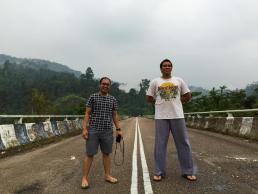
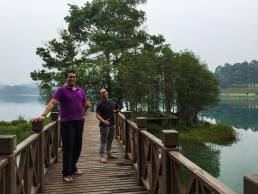
Both Adi and Asyraf usually begin their journey with two opposite schools of thought:
- “Am I going to get the story, and can I tell something new?”
- Whatever happens happens. This is an adventure.”
I stand straddled between the two.
Adventure is about perspective and rediscovering the old. As I turn on the ignition and hit the gas down the highway heading for the unknown, I anticipate both nothing and everything. On one midnight when we left for the East Coast, it was my turn behind the wheel. The radio was blaring with random music to which the three of us entertained ourselves to by singing along.
I was going at 120km/hour, one hand on the wheel and another rested along the open window. Time was linear like highway and we were speeding on it. There will be complications, troubles and challenges. But all these present to us both unique stories and opportunities.
After three years of travelling with the Blind Hikers, I’m left with the lesson of friendship. Travelling with family of friends is a unique test on its own. The negotiation for wants and the consensus for plans. A time when two members of the group would rather rest the afternoon away and you say it’s okay, because everyone’s had a tiring week. It is through travel you learn the true character of your companions, but more importantly, patience.
